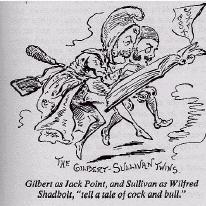|
 Opening night for the new opera was October 3, 1888. (October 3, incidentally
is also the date on which Brian Farrow premiered!) The first sign that it was to be a different sort of entertainment came on the title page of the audienceís libretto: A New and Original Opera. Not a "Comic Opera", not a "Nautical Comic Opera", not a "Supernatural Opera" or any of the other descriptive modifiers. Just an Opera!
Opening night for the new opera was October 3, 1888. (October 3, incidentally
is also the date on which Brian Farrow premiered!) The first sign that it was to be a different sort of entertainment came on the title page of the audienceís libretto: A New and Original Opera. Not a "Comic Opera", not a "Nautical Comic Opera", not a "Supernatural Opera" or any of the other descriptive modifiers. Just an Opera!
Then came the overture. It is the only truly symphonic concert overture in all the operas, as opposed to simply a medley of the various tunes strung together. Sullivan wrote it himself (not always the case for other operas) and actually finished scoring it a whole week before opening night!
While he was conducting it in the pit, Gilbert was onstage behind the curtain driving Jessie Bond crazy. Jessie had the part of Phoebe, who, in another G. and S. first, was to sing the opening number alone on stage. Gilbertís nervousness was starting to infect her; so she ordered him to get off the stage or she wouldnít be able to sing a note! Gilbert obeyed and, in typical Gilbertian fashion, headed off to watch a show in another theatre while his own premiere was in progress.
Gilbert had begun to have second thoughts about his departure from the tried-and-true topsy-turvydom. That very morning, he had urged Sullivan to agree that they cut a solo for Sgt. Meryll near the opening of the show, so that there wouldnít be too many serious or sentimental songs in a row. (The song was cut after opening night.) There was also general anxiety (shared still, I am sure, by all groups who produce the show) that the audience would be caught off-guard by a story that was not particularly silly. Jessie Bond, herself, often had the cute comic parts, such as Pitti-Sing in The Mikado, and the company waited to see if the audience would "laugh in the wrong place" during her self-pitying opening number. (They didnít!)
Sullivanís diary for October 3, 1888: Tired and nervous. Drove to theatre at 8 to meet Gilbert and settle one or two points - arr. to cut down 2nd verse of couplet in Finale; to leave in Templeís (Sgt. Meryllís) song for the first night. Crammed house - usual enthusiastic reception. I was awfully nervous and continued so until the duet ĎHeighdayí which settled the fate of the opera. Its success was tremendous; 3 times encored! After that everything went on wheels, and I think its success is even greater than "Mikado." 9 encores.
Gilbert, of course, managed to return to the theatre in time to take his bows with Sullivan. The numerous encores meant that those bows came well after midnight. The morning reviews raved about Sullivanís music, in particular his many Tudor-style touches, like the madrigal, "Stange adventure." Gilbert did not fare as well, facing suggestions of plagiarism from another well-known opera, Maritana. But although Sullivanís comparison with The Mikado was a bit optimistic, the original run of 423 performances was bested only by four other G. and S. operas (H.M.S. Pinafore, Patience, The Mikado, and The Gondoliers.)
The team made quite a few changes to the show after opening night, mostly cutting songs (like Sgt. Meryllís) or parts of songs or altering lyrics. Since quite a few of these changes involved the chorus, perhaps you would like to picture your reaction, after slaving to master the words and music for opening night, to having a package of changes thrown at you for the following night or for later weeks. We only change the blocking!
One change of lyrics merits special comment - and it has to do with the most controversial aspect of the show over the years. Gilbertís stage directions at the end of Act II are "Fairfax embraces Elsie as Point falls insensible at their feet." Actors and directors have interpreted "insensible" in a number of ways. George Grossmith, the original Jack Point, following Gilbertís direction, simply fainted. Would audiences used to his comic genius have accepted anything more? Later actors have sometimes taken to suffering a broken heart and dying. In his lifetime, Gilbert
must have witnessed some of these. He did not disapprove (especially if the audience accepted), but neither did he change his stage directions. However, he did alter the lyrics of the Finale in an 1897 revival. Originally, Elsie sang "Itís the song of a merrymaid, peerly proud, Who loved a lord, and who laughed aloud At the moan of a merryman moping mum..." Today, she sings, "Itís the song of a merrymaid, nesting near, Who loved her lord - but
who dropped a tear At the moan..."
Tears or laughter? The Yeomen of the Guard has its share of both.
|


